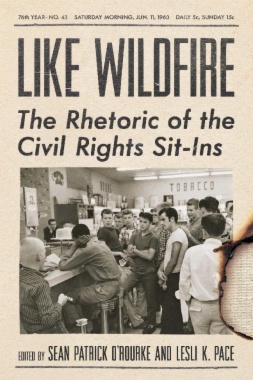The sit-ins of the American civil rights movement were extraordinary acts of dissent in an age marked by protest. By sitting in at "whites only" lunch counters, libraries, beaches, swimming pools, skating rinks, and churches, young African Americans and their allies put their lives on the line, fully aware that their actions would almost inevitably incite hateful, violent responses from entrenched and increasingly desperate white segregationists. And yet they did so in great numbers: most estimates suggest that in 1960 alone more than seventy thousand young people participated in sit-ins across the American South and more than three thousand were arrested. The simplicity and purity of the act of sitting in, coupled with the dignity and grace exhibited by participants, lent to the sit-in movement's sanctity and peaceful power.
In Like Wildfire, editors Sean Patrick O'Rourke and Lesli K. Pace seek to clarify and analyze the power of civil rights sit-ins as rhetorical acts—persuasive campaigns designed to alter perceptions of apartheid social structures and to change the attitudes, laws, and policies that supported those structures. These cohesive essays from leading scholars offer a new appraisal of the origins, growth, and legacy of the sit-ins, which has gone largely ignored in scholarly literature. The authors examine different forms of sitting-in and the evolution of the rhetorical dynamics of sit-in protests, detailing the organizational strategies they employed and connecting them to later protests. By focusing on the persuasive power of demanding space, the contributors articulate the ways in which the protestors' battle for basic civil rights shaped social practices, laws, and the national dialogue. O'Rourke and Pace maintain that the legacies of the civil rights sit-ins have been many, complicated, and at times undervalued.
- Cover�������������������������������
- LIKE WILDFIRE�������������������������������������������������������
- Title�������������������������������
- Copyright�������������������������������������������
- Dedication����������������������������������������������
- Contents����������������������������������������
- Series Editor’s Preface�������������������������������������������������������������������������������������
- Acknowledgments�������������������������������������������������������������
- Introduction: Civil Rights Sit-Ins and the Rhetoric of Protest����������������������������������������������������������������������������������������������������������������������������������������������������������������������������������������������������������
- 1. Sparks: The Origins of the Sit-Ins before Greensboro�������������������������������������������������������������������������������������������������������������������������������������������������������������������������������������
- Liminal Protest: Eleanor Roosevelt’s “Sit-Between” at the 1938 Southern Conference for Human Welfare����������������������������������������������������������������������������������������������������������������������������������������������������������������������������������������������������������������������������������������������������������������������������������������������������������������������������
- “Our boys, Our bonds, Our brothers”: Pauli Murray and the Washington, D.C., Sit-Ins, 1943–1944����������������������������������������������������������������������������������������������������������������������������������������������������������������������������������������������������������������������������������������������������������������������������������������������������������
- Lunch Counters and the Public Sphere: The St. Louis Sit-In as an Emerging Counterpublic�������������������������������������������������������������������������������������������������������������������������������������������������������������������������������������������������������������������������������������������������������������������������������������
- From “Dead Wrong” to Civil Rights History: The Durham Royal Seven, Martin Luther King’s 1960 “Fill Up the Jails” Speech, and the Rhetoric of Visibility�������������������������������������������������������������������������������������������������������������������������������������������������������������������������������������������������������������������������������������������������������������������������������������������������������������������������������������������������������������������������������������������������������������������������������������������������������������������������������������
- The Nashville Sit-Ins: Successful Nonviolent Direct Action through Rhetorical Invention and Advocacy����������������������������������������������������������������������������������������������������������������������������������������������������������������������������������������������������������������������������������������������������������������������������������������������������������������������������
- 2. Conflagration: The Spread of the Sit-Ins across the South����������������������������������������������������������������������������������������������������������������������������������������������������������������������������������������������������
- Reading Bodies, Reading Books: A Rhetorical History of the 1960 Greenville, South Carolina, Sit-Ins�������������������������������������������������������������������������������������������������������������������������������������������������������������������������������������������������������������������������������������������������������������������������������������������������������������������������
- Nothing New for Easter: Rhetoric, Collective Action, and the Louisville Sit-In Movement�������������������������������������������������������������������������������������������������������������������������������������������������������������������������������������������������������������������������������������������������������������������������������������
- Suffer the Little Children: Propriety and Piety in the 1963 Birmingham, Alabama, Youth Demonstrations for Civil Rights����������������������������������������������������������������������������������������������������������������������������������������������������������������������������������������������������������������������������������������������������������������������������������������������������������������������������������������������������������������������������������
- The Mustard Man and the Students’ Stand: Analyzing Images from the 1963 Jackson Sit-In����������������������������������������������������������������������������������������������������������������������������������������������������������������������������������������������������������������������������������������������������������������������������������
- From Sitting In to Sitting Out: Gloria Richardson and the 1963 Cambridge Movement�������������������������������������������������������������������������������������������������������������������������������������������������������������������������������������������������������������������������������������������������������������������
- Wade in the Water: African American and Local News Accounts of the 1964 Monson Motor Lodge Swim-In����������������������������������������������������������������������������������������������������������������������������������������������������������������������������������������������������������������������������������������������������������������������������������������������������������������������
- 3. Embers: The Legacies of the Sit-Ins����������������������������������������������������������������������������������������������������������������������������������
- Televisuality and the Performance of Citizenship on NBC’s “Sit-In”����������������������������������������������������������������������������������������������������������������������������������������������������������������������������������������������������������������������
- Forgetting the 1960 Biloxi, Mississippi, Wade-Ins: Collective Memory, Forgetting, and the Politics of Remembering Protest�������������������������������������������������������������������������������������������������������������������������������������������������������������������������������������������������������������������������������������������������������������������������������������������������������������������������������������������������������������������������������������������
- Visualizing a Civil Rights Archive: Images of the Sit-in at the Counter and Other Objects�������������������������������������������������������������������������������������������������������������������������������������������������������������������������������������������������������������������������������������������������������������������������������������������
- Direct Action, Then and Now: Comparing the Sit-Ins and Occupy Wall Street�������������������������������������������������������������������������������������������������������������������������������������������������������������������������������������������������������������������������������������������
- The Longest Sit-In����������������������������������������������������������������������
- Afterword: Chiseling at a Fossilized Memory—Connections, Questions, and Implications����������������������������������������������������������������������������������������������������������������������������������������������������������������������������������������������������������������������������������������������������������������������������
- Selected Bibliography�������������������������������������������������������������������������������
- Contributors����������������������������������������������������
- Index�������������������������������

